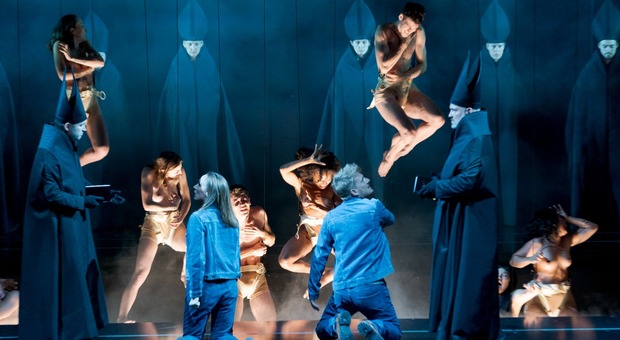The early Roman opera triumphs in Vienna, sold out for “The Representation of soul and body”
The early Roman opera triumphs in Vienna. “The representation of soul and body“By Emilio de ‘Cavalieri, written in the holy year 1600 for the oratory of the Chiesa Nuova, was staged last Sunday with great success as the inaugural show of the season of Theater an der Wien in Vienna. All one thousand three hundred seats are sold out, without distancing but with very strict controls at the entrance, of this room inaugurated in 1801 which hosted the “premiere” of Beethoven’s “Fidelio” in 1803. In recent decades it has become the Viennese reference point for originality and innovation in the choice of repertoire and set-ups. Robert Carsen, has signed the direction and the sets, making it clear how this “Representation to recite singing” with many allegorical characters has great dramaturgical relevance.
Florence, the Teatro della Pergola reopens with the national premiere of “The Dubliners” by Sepe
The Prologue, in which two young men discuss the meaning of life, has been completely rewritten by Carsen and Ian Burton in a veritable linguistic babel: on stage the whole company in modern travel clothes. Time, dressed like a homeless man with a bottle in his hand, warns them about the transience of life. Soul and Body are a young couple in jeans and trolley in hand discussing the best systems. Warned by Time, guided by Intellect, tempted by Pleasure and by the World, thanks to a Guardian Angel and the Council they will arrive in Paradise through an initiatory journey.
The scenic layout is essential and is solved with a masterful use of colors and lights. The temptations of pleasure are entrusted to a swarm of wild red figures thirsty for sex. Black is the color of Intellect and Council, golden yellow dominates the World and Worldly Life, the Guardian Angel and the blessed souls are white.
On stage there is a revolving platform in the center and a door in the backdrop. The third act is a masterpiece: the beaten and damned souls rise and fall occupying the stage in all its height, now happy and bright, now desperate and trembling, a clear quote from Michelangelo’s Last Judgment, which the composer knew very well: the great painter dedicated sonnets and drawings to his father, the noble Tommaso de ‘Cavalieri. The merit of the director Giovanni Antonini, at the helm of his group of specialists in the “Harmonic Garden”, was to support the musical dictation of the acting, imparting fluidity and breath to each note. The Arnold Schönberg Choir directed by Edwin Ortner is excellent and the musicians of “Il giardino harmonico” are impeccable for sound quality and precision even in the instrumental interludes. The cast is very good, in particular the two young and successful Italian singers: the countertenor Carlo Vistoli in the role of the Angel and the mezzo-soprano Giuseppina Bridelli in that of Vita Mondana and Anima Beata.




